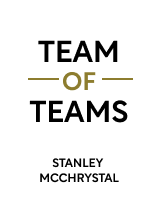

This article is an excerpt from the Shortform book guide to "Team of Teams" by Stanley McChrystal. Shortform has the world's best summaries and analyses of books you should be reading.
Like this article? Sign up for a free trial here .
What are the most noteworthy Team of Teams quotes by Stanley McChrystal? What do they say about leadership and team collaboration?
Team of Teams is a book that tells the true story of how General Stanley McChrystal transformed the US task force in the middle of the war with Al Qaeda. The following Team of Teams quotes capture some of his key ideas about leadership and the importance of team-to-team collaboration in the modern age of interconnectedness.
Keep reading for Team of Teams quotes by General Stanley McChrystal.
Team of Teams: Quotes to Think About
“The temptation to lead as a chess master, controlling each move of the organization, must give way to an approach as a gardener, enabling rather than directing. A gardening approach to leadership is anything but passive. The leader acts as an “Eyes-On, Hands-Off” enabler who creates and maintains an ecosystem in which the organization operates.”
In Team of Teams, McChrystal contrasts two leadership mindsets: the chess master and the gardener. Most leaders tend to lead like a chess master, striving to control every move of their subordinates. According to McChrystal, a better way to lead is to be like a gardener and focus on creating the conditions that enable effective teamwork without the constant oversight of the leader.
“Efficiency is doing things right; effectiveness is doing the right thing.”
In discussing qualities of an effective team, McChrystal also differentiates between efficiency and effectiveness, drawing on Peter Drucker’s theory of management. Drucker defined efficiency as doing things right and effectiveness as doing the right things.
According to McChrystal, the task force was efficient at what it did, but not effective because it wasn’t adapting to do the right things. Instead of strengthening its processes or deploying more resources, the U.S. needed a structure that could reconfigure to respond quickly to unpredictable situations. To put it another way, instead of a factory-like system of known inputs producing predictable outputs, the task force needed a system that could convert unpredictable inputs into unknown but ultimately desirable outputs.
“Education is resilient, training is robust.”
According to McChrystal, the ideal system for functioning in a complex environment where there are many types of unforeseen disruptions is one that’s both resilient and robust—that is, one that’s both adaptable and strong.
For example, a coral reef is resilient but not robust. If a reef is large enough, it can survive being partially destroyed by a hurricane by regrowing (resilience). But a reef isn’t robust or strong enough to regrow if it suffers too much damage too fast.
Making a system robust involves strengthening its parts while making it resilient comes from linking the parts so they can reconfigure and adapt. Though you can’t control the behavior of storms at sea, you can build a boat that’s robust, and train a resilient crew to adapt to the conditions.

———End of Preview———
Like what you just read? Read the rest of the world's best book summary and analysis of Stanley McChrystal's "Team of Teams" at Shortform .
Here's what you'll find in our full Team of Teams summary :
- How General Stanley McChrystal transformed the U.S. Joint Special Operations Task Force
- What teams that operate well can offer to an organization
- How the team of teams organizational model helped bring down a major Al Qaeda leader






